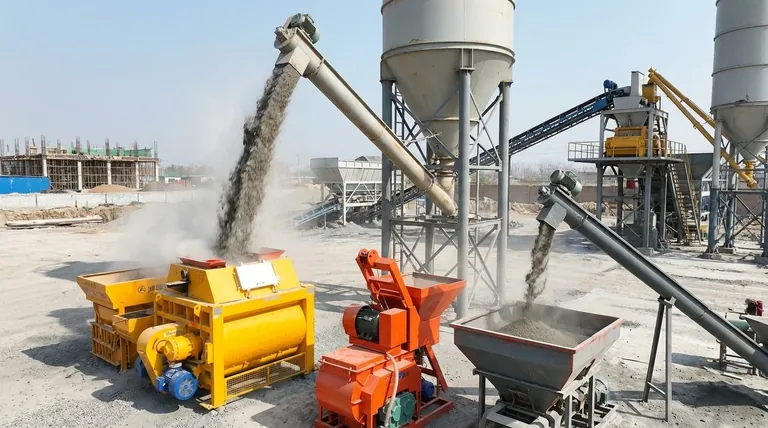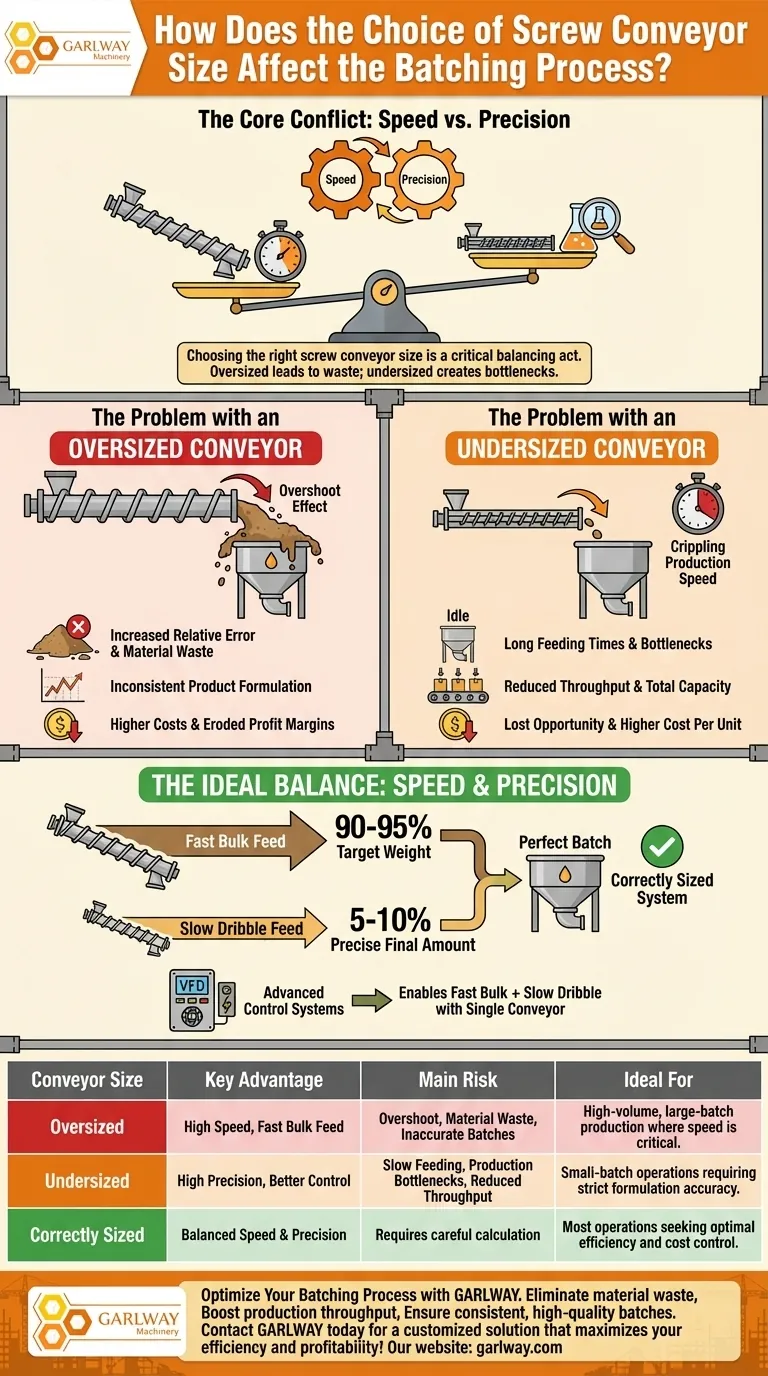Choosing the right screw conveyor size is a critical balancing act. An oversized conveyor compromises the accuracy of your batching, leading to wasted material and higher costs. Conversely, an undersized conveyor slows down your entire production line, creating a bottleneck that reduces overall efficiency.
The core challenge in selecting a screw conveyor is not simply about moving material, but about matching the conveyor's delivery rate to your mixer's capacity and your product's required precision. This decision directly dictates the balance between production speed and batch accuracy.

The Core Conflict: Speed vs. Precision
A screw conveyor's purpose in a batching system is twofold: move a bulk amount of material quickly, and then add the final amount with precision to hit a target weight. The physical size of the conveyor directly impacts its ability to perform both of these functions well.
Why Size Dictates Flow Rate
The capacity of a screw conveyor is determined by its diameter, pitch, and rotational speed. A larger conveyor moves a significantly greater volume of material with each rotation of its helical blade. This is the fundamental physical constraint that governs the entire process.
The Goal of Batching
An ideal batching process is both fast and accurate. Efficiency demands that the mixer is fed material as quickly as possible to minimize cycle time. Accuracy demands that the precise amount of each ingredient is delivered to ensure consistent product quality. The size of the conveyor places these two goals in direct opposition.
The Problem with an Oversized Conveyor
Selecting a conveyor that is too large for the mixer's batch size introduces significant issues with control and accuracy.
The "Overshoot" Effect
When the system approaches its target weight, the conveyor stops. However, a large conveyor moves a large slug of material per rotation. This final pulse of material can easily be more than the remaining amount needed, causing the system to "overshoot" the target weight.
Increased Relative Error
This overshoot creates a high relative error. For a small batch, an extra 2kg of wasted material is a much larger percentage of the total batch than it would be for a massive batch. This leads to inconsistent product formulation from one batch to the next.
The Financial Impact
Consistent inaccuracy directly translates to higher costs. You are consuming more raw material than specified for every batch, eroding your profit margins over time.
The Problem with an Undersized Conveyor
While a smaller conveyor offers more precision, choosing one that is too small for the mixer creates a classic production bottleneck.
Crippling Production Speed
The primary issue is excessively long feeding times. Your mixer, a high-cost piece of capital equipment, will sit idle waiting for the undersized conveyor to slowly deliver the required material.
Reduced Throughput
This bottleneck directly reduces your plant's overall throughput. You will produce fewer batches per shift, limiting your total production capacity and ability to meet demand.
The Financial Impact
The cost of an undersized conveyor is lost opportunity. Lower production efficiency means a higher cost per unit produced and an inability to maximize the output of your entire plant.
Understanding the Trade-offs
Making the right choice requires viewing the conveyor and mixer as a single, integrated system, not as separate components.
The Mixer-Conveyor Relationship
The ideal flow rate from the conveyor should be matched to the batch size and the required cycle time of the mixer. The goal is to deliver the bulk of the material (e.g., 90-95% of the target weight) as rapidly as possible.
The Precision Point
The true test comes at the end of the feed cycle. The conveyor must be able to "dribble" or "jog" small, controlled amounts of material to hit the final target weight precisely without overshooting. An oversized conveyor physically cannot do this effectively.
Advanced Control Systems
Modern control systems using Variable Frequency Drives (VFDs) can help mitigate this trade-off. A VFD allows the conveyor to run at a high speed for the bulk feed and then slow down dramatically for a controlled, precise final feed. However, even a VFD cannot overcome a fundamental size mismatch.
Making the Right Choice for Your Goal
To select the correct size, you must first define your primary operational priority.
- If your primary focus is high-precision for smaller batches: Opt for a smaller diameter conveyor that provides superior control and minimizes the risk of overshooting the target weight.
- If your primary focus is high-volume, rapid throughput for large batches: Select a larger conveyor sized to feed the mixer as quickly as possible, ensuring the conveyor is never the bottleneck in your process.
- If you require a balance of both speed and precision: Invest in a system with a two-speed motor or a VFD to enable both fast bulk feeding and slow, accurate dribble feeding from a single conveyor.
Ultimately, aligning your screw conveyor's capabilities with your specific production priorities is the key to an optimized and cost-effective batching operation.
Summary Table:
| Conveyor Size | Key Advantage | Main Risk | Ideal For |
|---|---|---|---|
| Oversized | High Speed, Fast Bulk Feed | Overshoot, Material Waste, Inaccurate Batches | High-volume, large-batch production where speed is critical |
| Undersized | High Precision, Better Control | Slow Feeding, Production Bottlenecks, Reduced Throughput | Small-batch operations requiring strict formulation accuracy |
| Correctly Sized | Balanced Speed & Precision | Requires careful calculation | Most operations seeking optimal efficiency and cost control |
Optimize Your Batching Process with GARLWAY
Struggling with inaccurate batches or slow production? The right screw conveyor is key to balancing speed and precision. At GARLWAY, we specialize in construction machinery, including concrete batching plants, mixers, and conveying systems designed for construction companies and contractors globally.
Our experts will help you select the perfect conveyor size to:
- Eliminate material waste from overshooting.
- Boost your production throughput by avoiding bottlenecks.
- Ensure consistent, high-quality batches every time.
Don't let the wrong equipment slow you down. Contact GARLWAY today for a customized solution that maximizes your efficiency and profitability!
Visual Guide

Related Products
- Belle Mixer Drum Self Loading Mortar Mixers JS3000
- Portable Electric Small Cement Mixer Concrete Machine
- Commercial Electric Concrete Mixer Machine HZS 50 Small Batch Plant for Sale
- Belle Cement Mixer JS2000 Volumetric Concrete Mixer for Harbor Freight
- JZC500 Large Cement Mixer Machine Price for Concrete Mix
People Also Ask
- What type of equipment is generally used in commercial concrete mixing stations? A Complete Guide to Plant Systems
- What does liquid transportation in a concrete batching plant involve? Ensuring Precise Mix Quality and Consistency
- What is the role of a concrete batching plant in the construction industry? Achieve Quality, Speed, and Cost Control
- What are the consequences of operational errors by technicians in new mixing stations? Avoid Costly Downtime and Damage
- Why is internal maintenance of a cement silo important after each use? Protect Your Investment & Avoid Downtime
- What is the future outlook for 100-ton cement silos? Optimized for Efficiency and Smart Construction
- What is a Concrete Batch Plant and what does it produce? Industrial-Grade Concrete Production
- What type of sealing is used in the shaft end of concrete mixing stations? A Multi-Layer Defense System Explained



















